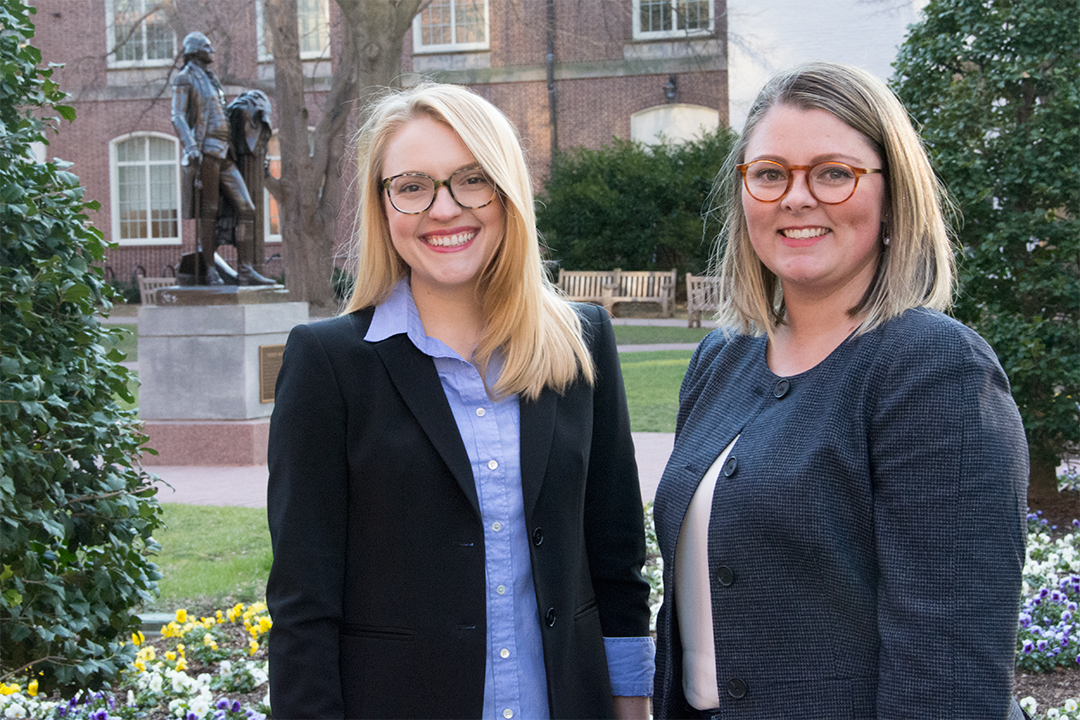In January 2019, GW Law students Joy Bagwell and Miranda Moorman, both Class of 2019, traveled to Camp Justice in Guantanamo Bay, Cuba to observe the 33rd round of pre-trial hearings for the alleged 9/11 “masterminds.” The hearings included five co-defendants who are charged with various levels of involvement in the 9/11 attack. The trial is often referred to as the “KSM trial” because of the lead defendant’s (Khalid Sheik Mohammed) initials.
Ms. Bagwell came to GW Law after earning her undergraduate degree from the University of North Florida. She says her national security and international policy courses helped shape her interest in law school and human rights specifically. “I was fascinated by the ways national security competes with, yet often complements, human rights concerns. Much of this tension is ironed out through legal mechanisms, and I have been lucky to explore that process through various internships and GW Law courses,” she said.
Ms. Moorman earned her undergraduate degree from Oklahoma State University. She is a part-time student working as a Senior Legislative Assistant at the U.S. House of Representatives. “Although I was a child when the bombing of the Murrah building happened, it framed the world I grew up in. My uncle is a current county sheriff and a retired trooper with the Oklahoma Highway Patrol. He is the man that arrested Timothy McVeigh just hours after the bombing. I grew up watching my uncle interacting with local, state, and federal agencies to protect Oklahomans, and I knew I wanted to play a role in that,” she shared.
Both Ms. Bagwell and Ms. Moorman were at Camp Justice for one week. “Normally, open and closed court sessions take place Monday through Friday,” Ms. Bagwell explained. “During our week, however, hearings were stalled after two days because the Judge had to be evacuated for emergency eye surgery.”
Ms. Bagwell attended the proceedings as part of her national security law internship with Human Rights First, a nonprofit, nonpartisan international human rights organization. As an intern, she worked with GW Law alumna Rita Siemion, JD ‘06, and conducted research on national security, human rights, and humanitarian law issues and wrote blog posts for the Human Rights First website. Her article, “Detached Retina Stalls 9/11 “Mastermind” Trials at Guantanamo Bay,” summarizes main legal issues in the trials.
While at Camp Justice, Ms. Bagwell was interested in observing the dynamics of a courtroom conducting one of the most famous trials in U.S. national security history. “I am of the impression that everyone I observed is both highly skilled and cares deeply about conducting terrorism trials in a fair and efficient manner. The sheer volume of issues that need to be addressed, as well as the complexity of those issues, creates an environment that can seem difficult and cumbersome. While there is little consensus within the legal community regarding the issues haunting the Guantanamo military commission system, I am interested to see how this instantiation of military justice informs future detention policies,” she said.
Ms. Moorman attended the proceedings as an NGO Observer through GW Law’s Federalist Society’s partnership with Judicial Watch, a conservative non-partisan educational foundation. “The military commission isn’t the same as any other U.S. legal system, which has created new issues. The entire process, however, makes us, as Americans, reassess how we weigh national security against individual liberties,” Ms. Moorman explained.
For students interested in human rights or national security, Ms. Bagwell recommends they get tangible and diverse experiences. “National security and human rights law are cross-section topics. The better you are at stitching these issues together, the more robust of a legal analysis you will be able to provide internship supervisors and potential future employers,” she said.
Ms. Moorman encourages students to overcome their preconceived notions and to be willing to listen to others. “When discussing issues relating to national security and personal liberties, it’s easy to surround yourself with people who think like you. To truly balance the two, you need an open exchange of ideas. Only listening to one set of ideas not only limits your ability to see the entire scope of the issue but also creates policies and laws with vulnerabilities.”


